#fantasy wouldn’t exist without weird gay subtext romances
Text
Ok I’ve been reading Acotar and have just finished the second book PLEASE TELL ME THERE IS ATLEAST ONE GAY PERSON. GIVE ME LESBIANS. YOURE TELLING ME IN A WORLD WHERE SPRING CAN BE ETERNAL THERE ARENT ANY QUEERS?!
#acotar#a court of thorns and roses#a court of mist and fury#fantasy wouldn’t exist without weird gay subtext romances#you’re telling me Lucien and tamlin aren’t mates?? boo hooo.#also let feyre wear pants again she is suffering in those dresses all day everyday
8 notes
·
View notes
Text
Episode Ignis Feels Like Fanfiction and That’s a Good Thing
Ok so I’m having a Thought.
You know when people say something reads “like fanfiction”, and it’s meant to be a criticism? The phrase is one of those intangibles, one of those agreed-upons, where no one can define it quite accurately but everyone thinks they know what it means. Usually it’s a combination of deviation from the original tone, bleaching out character flaws and complexities, a lack of understanding of nuance, and a reverent or worshipful attitude towards old characters, moments, settings, and iconography (and iconography is just the Stuff. Star Wars iconography is lightsabers, wookies and Jedi robes).
That’s a pretty reductive description of fanfiction of course, because a lot of fanfic - whether it’s well or poorly written - doesn’t necessarily follow those patterns. Weirdly enough, saying a sequel or reboot reads “like fanfiction” often implies that the writer doesn’t understand something about the source material - that they’re oversimplifying, or they’re fanning about while failing to understand what a “good” sequel would actually require. And that’s pretty ironic, because fans - obsessive detail-hoarding, secondary-character-worshipping pastiche-crafters that they are - often know the source material better than anyone, sometimes better than the creators themselves, and they are very aware of what they are erasing or changing when they move Marvel into a fluffy coffee shop AU.
But I’m kind of digressing, because my point is that “this feels like fanfiction” shouldn’t be seen as a criticism, but rather as a gut feeling that we need to unpack. Sometimes it leads to legitimate criticism that, while worth addressing, actually has very little to do with fanfiction. And sometimes it leads to this weird 4:30 am conclusion: Episode Ignis is when “this feels like fanfiction” should be deployed as a compliment. Spoilers onward, for both Episode Ignis and FFXV.
I’m talking specifically about the alternate ending, here, which is tantamount to an FFXV fix-it fic. In this version Ignis averts the tragic ending of FFXV, and though he prepares to sacrifice his own life to do so, it ends up costing nothing. Ignis survives with even prettier hero-scarring than he gets in the regular plot. The episode fills in a sizable story gap after Leviathan knocks Noct out, and closes a few additional plotholes (I wondered what happened to that one obnoxiously overdesigned Imperial guy: turns out Ravus stabbed him). It spends some time with likable characters (Ardyn, yeeee) and underdeveloped characters (again, Ravus). Ignis gets roughed up and drenched, loses the glasses, and I’m 90% sure the animators made his eyes bigger in the cutscenes for extra pretty. He gains maximum plotline power, and Adam Croasdell voice acts the shit out of some sassy comebacks and anguished screaming (ok, this is unrelated, but when he’s doing the regular stormbind combo, it sounds like he screams FUCK in one of his battle grunts and it makes me laugh every time). He can liberate Altissia more or less by himself, and that’s before he drives a goddamn speedboat away from pursuant megarobots. So for anyone calling Mary Sue, yes, Ignis dives headfirst into that. He basically becomes Magic James Bond.
The whole episode is also pretty blatantly queer-coded. We get a very cuddly flashback to kid Noctis, and Ignis’s vow to stand at his side. Ignis is monomaniacal when it comes to finding Noctis. Noctis eiher drops the l-word, referring directly to Ignis and the freshly fridged Lunafreya (I’m still salty about that one, sorry), or says Ignis will always be in his heart depending on the ending. There’s a fantastic gifset going around of the official couples in previous Final Fantasies (Squall and Rinoa, Tidus and Yuna) declaring the exact same thing Ignis does in the alternate ending. “Rinoa, even if the world turns on you, I’ll be your knight”. “There’s no way I’ll let Yuna go”, even if I have to break all the rules of your stupid religion. Even if it costs my own life, I won’t let you take Noctis away. The queer subtext here is one of those things where it’s purposefully vague - just enough emotional evidence and physical contact that you can read romantic feelings there if you want, but just short of an actual romance to leave interpretations open. If you’re convinced Noctis and Luna were in love, Episode Ignis probably won’t debunk that.
So Ignis and his Episode are both powerful, emotional, pretty, potentially kinda gay, and ridiculously awesome.
And honestly, it is phenomenal.
Episode Ignis is a blast to play. His combat style is very fun and quick and fluid and flashy, and the grappling hook in the first portion makes you feel superheroic. Killing Ardyn, meanwhile, makes you feel godlike. It is an incredible surge of adrenaline to take on armies and deities by your lonesome. The gameplay and narrative reflect each other here, just like they do in the base game. FFXV seems happy at first, and the combat is pretty entertaining with all the goofy combo-attacks, but that game is a tragedy. It’s all the more tragic by how fun it is to begin with, and by the end it is painful to play. Characters get older, places fall apart, people die, and you have to escort Ignis around for a chapter while he grows used to being blind and Gladio constantly bitches at you for walking too fast. The photo mechanic is introduced to break your heart later, to show you how fleeting youth and pleasure can truly be under backbreaking destiny.
And in retaliation, Episode Ignis thrives on the power of Fuck You. Long commutes by car, mundane in the moment but peaceful upon reflection decades later? Fuck You, I have a grappling hook. Sections that force you to walk slowly through a dungeon and think about what you’ve done? Fuck You, I’ve got two daggers, lightning teleportation and button-mashing hands. Musings about the ravages of time, and aching nostalgia for youth? Fuck You, Ignis is prettier than ever. A tragic ending pre-ordained by prophecy? Fuck You, Ignis is going to re-write that fate by being clever, patient, and brave enough to sacrifice his life, but double Fuck You, he gets to live as well. Bullets flying, health bar low, multiple explosions and Atlas Ripped decking airships in the background? Fuck. You. It’s time to make some fucking soup.
With all that in mind, it makes sense that people might accuse Episode Ignis of being tone-deaf, of being fanfiction in all the “bad” ways - it neglects the nuance of the original, and papers over complex themes so everything can end up hunky-dory, but I still think that’s too easy.
Here’s the thing: Episode Ignis can only exist as fanfiction - or as alternate-ending DLC, I guess. FFXV is the story of Noctis and his story has an ending and it’s horribly, horribly sad, but it’s also what the story is built around. You might find it too depressing or too grim or you might find it just right, but it is well-structured. FFXV is careful with its themes and patterns and foreshadowing.
Because of that care, Ignis screwing Ardyn’s plans out of whack and saving Noctis from his fate couldn’t occur in the main game. FFXV is not about Ignis. It’s about Noctis. And the gameplay, built as it is around creating nostalgia - photographs, long car rides, camping, friendship - wouldn’t work if the ending wasn’t agonizing enough to make you long for the good old days. Maybe Noctis didn’t have to die or maybe he did, but the ending of FFXV was always going to hurt.
FFXV is an emotional project, and that project is to make the player painfully nostalgic. With that intriguing goal achieved, Episode Ignis exists as a response, and it can never really be more than that. It’s an ending I like better, but it is an alternate ending.
If you think about it, Episode Ignis didn’t need that alternate ending. It could have existed perfectly well as a companion to FFXV, filling in a much-needed blank (and without the alternate ending that’s exactly what it does). But in making a response to FFXV instead, they challenged a lot of assumptions FFXV needed to make in order to tell its story. FFXV assumes its prophecy is the only answer, as do its characters. FFXV yanks a great deal of agency away from Ignis, Prompto and Gladio when it asks them to sit still for a decade and wait for their friend to die without hunting for an alternative
Why can’t they try something else? Why can’t they defeat their nemesis on their own terms? I mean, who the heck does Bahamut think he is, anyway? Who says the ending can’t be happy, and the future can’t be bright?
Those are exactly the questions a fanfiction writer would ask. FFXV created those questions, and Episode Ignis addresses them, but in a way that acts as more of a breach than a closure. It’s one route to a happy ending - so maybe there are more. This is also the reason I brought up the queercoding in Episode Ignis. If there is any genre that needs a complete overhaul from grimdark tragedy into happy endings, it’s the scourge that is the modern queer romance story. There are so many of those bloody stories ending in anguish or separation or suicide or displeasure, and not nearly enough fairytales. Having a tragic ending overturned by the power of queer love is an insanely empowering experience, and that’s probably why you see so many posts about how Ignis’s gay love can pierce the veil of death and save the day. Episode Ignis didn’t need its queercoding any more than it needed its alternate ending, but the two make sense together: both of them are stories that people are absolutely aching for.
I don’t know if I’ve ever seen anything quite like this - a company actively revising their story, overturning its mood, questioning its plot, granting a completely different ending, and then asking fans to pay 6.99 for it. It’s different from alternate film endings, because those are DVD extras and one always wins the theatrical release. It’s different from re-imaginings or adaptations because Episode Ignis is...just not quite that. It can’t exist on its own, unlike most remakes. Video games are always fluid texts to a certain extent, but now developers are even relinquishing the solidity of lore and cutscenes. It’s so odd.
At the decision point of Episode Ignis, you can use R1 and L1 to flip the camera back and forth, moving between a shot of Ardyn and a shot of Ignis. It’s a tiny, insignificant moment, one that almost feels like a mistake - like maybe the developers couldn’t figure out how to stage a normal shot-reverse-shot. But that moment became an oddly powerful synecdoche for what Episode Ignis was to me. If you want to look at this story from a different angle, well, go for it. Here’s another place you can point the camera. Maybe the sun will rise over there too.
39 notes
·
View notes
Text
Nonbinary characters in Steven Universe
Steven Universe has been (rightly) praised for its inclusion of nonbinary gender characters. We live in a world where media almost exclusively presents characters who are men or women (and often treats binary trans people, when they're even included, as if they are an additional "middle" gender even if they don't identify that way). So of course, characters who are agender or nonbinary are long overdue and worth celebrating.
HOWEVER.
Steven Universe includes two forms of nonbinary characters, and they both involve aliens. We have Gems who come from space and are largely femme-presenting nonbinary aliens (who use she/her pronouns, but that does not make them female), and we have Fusions whose gender and pronouns are shifted to neutral or undetermined when Steven is included.
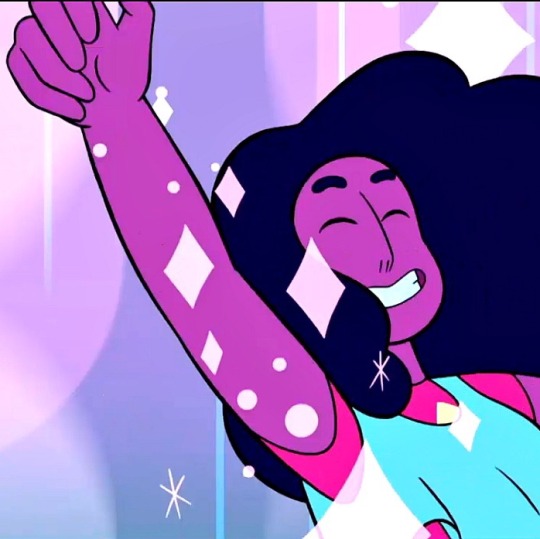
While it's still great to have such a cool science fiction show that's got nonbinary characters, presenting their nonbinary gender as a consequence of "mixed" genders or extraterrestrial origin subtly associates nonbinary gender with being nonhuman.
Stevonnie is referred to canonically as "they/them," and it sets a great example, but we know they are a Fusion of Connie (she/her) and Steven (he/him).
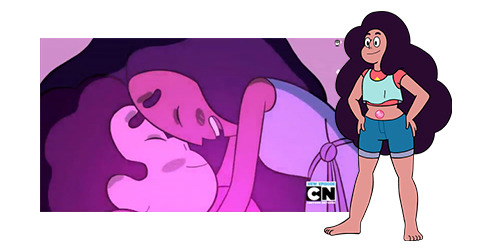
Smoky Quartz has been referred to as "they" in a context where it was unclear whether it was them or their components being talked about, but given the precedent, I assume Smoky is also they/them: another Fusion of a she/her and a he/him. Fusions of Gems who both use "she/her" are also referred to as she/her, so these pronouns are not reserved for Fusions.
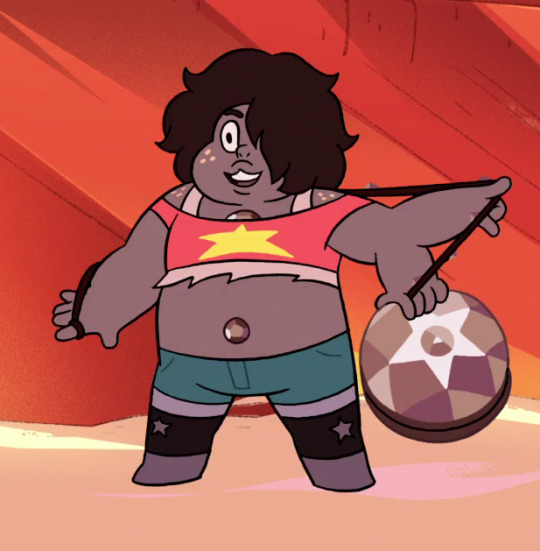
I know several nonbinary, trans, and otherwise gender-atypical people who relate really hard to Stevonnie and/or Smoky, and are thrilled to have this kind of representation. It's so excellent to see Stevonnie, with their femme-leaning androgyny and their clear attractiveness to guys and girls on the show, developing confidence and never dragging the audience through a Very Special Episode where they feel required to disclose and discuss their gender. They're worried about other things, but this gender thing? It just is, and people in their life don't make a big deal out of that part of it. But I think we need more, and I think Steven Universe is just the show to do it.

We currently DO NOT HAVE any known nonbinary characters in the show who are not either aliens or Fusions. If we continue to represent nonbinary characters as having a nonbinary gender only because they're a mixture of male and female or influenced by nonhuman gender concepts, we're presenting it as a concept but not as one that might be applicable to someone in the non-magical, non-alien, everyday Earthly world.
But nonbinary humans are everywhere, and I would love to see someone show up in the show with casually referenced nonbinary representation--so we know this isn't a gender concept we can only accept in association with fantasy concepts.
What's interesting is the Steven Universe COMICS are already doing this. First, in Issue 1 of the ongoing comic series begun in early 2017, Steven, Peridot, and Lapis find a baby bird. Steven automatically defaults to they/them pronouns for the bird, and after they argue about the bird's name for a while, they settle on naming them Susan.
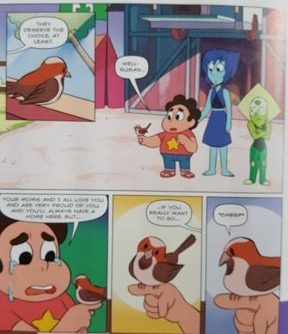
Susan is a name pretty heavily coded as female in Western society, but they set a great example here by NOT having Steven change to she/her pronouns to refer to the bird just because they have a traditionally feminine name. There is no discussion of what pronouns to use and no justification of this. It's just there for you to accept, casually, as it should be.
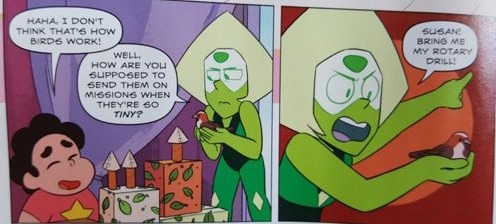
In Issue 2 of the ongoing comic series, we have Stevonnie going to prom with Kiki. There is plenty of weirdness associated with this because Kiki doesn't know Stevonnie is a Fusion of two kids and they're both struggling with teen awkwardness that has nothing to do with Stevonnie's Fusion status, but what's significant about this is Kiki's automatic, consistent use of they/them pronouns for Stevonnie when introducing them to her friends.
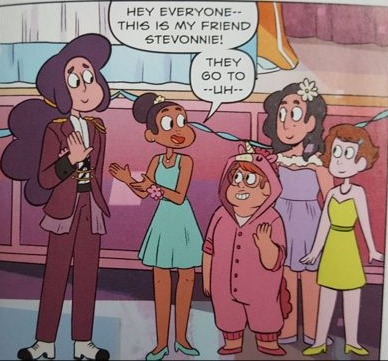
Plus, Stevonnie and Kiki use the same dressing room when trying on dresses, try on a variety of clothes (some of which are traditionally gendered either male or female), and don't completely ignore the issue.
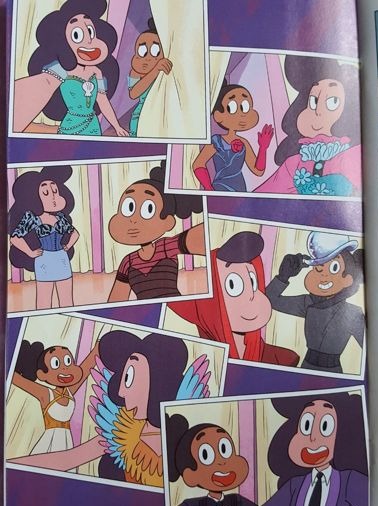
Kiki asks Stevonnie if they prefer to lead or follow, and that's a really nice acknowledgment that the expected gender roles have to be redefined for a dance couple like them.
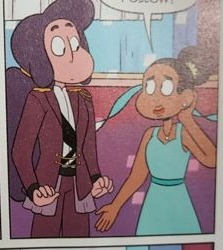
If you just present a nonbinary character where no one's ever confused about how to treat them, you're ignoring programming nearly everyone in our society has, and it's inevitable that someone like Stevonnie would sometimes confuse people if they're trying to squeeze them into a gender box--and unfortunately, that also sometimes means being misgendered, like when Kevin called Stevonnie "girl" during their first appearance on the show.
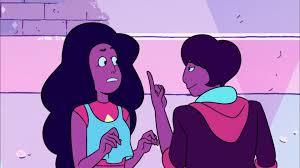
But then, most notably, in Issue 4 of the ongoing comic series, Peridot goes to a Renaissance Faire and watches a joust, with a visiting knight named "Sir Render." And Sir Render, despite their traditionally masculine appearance and title of "Sir," is consistently referred to with they/them pronouns.
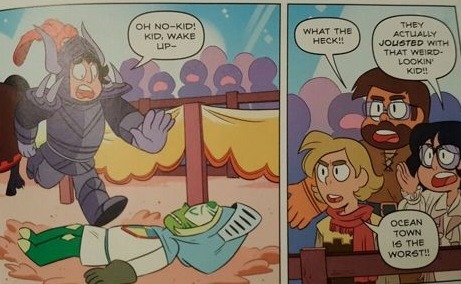
Even though they're a pretty beefy, hefty knight, and even while they're getting booed by audience members who want them to lose. Nonbinary people do not have to be androgynous, and they/them pronouns can apply to people who are frequently perceived as traditionally feminine or traditionally masculine. Sir Render doesn't HAVE to "try" to look androgynous or less traditionally masculine to have their pronouns respected. And Sir Render is a background human. Not a Fusion and not an alien. This comic also includes the phrase "Lords, ladies, and gentle-enbies." Wow.
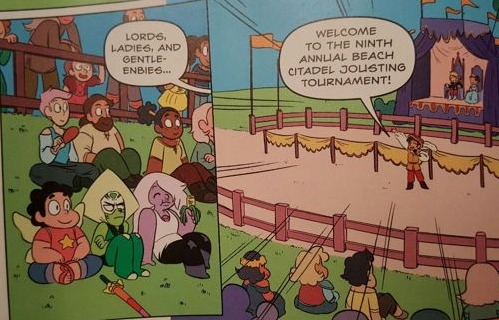
Some people have criticized Steven Universe for featuring so many same-gender relationships between Gems without broaching that subject with humans. Gems are not women/girls, but because of their gender presentation and consistent use of she/her pronouns, they are clearly designed to at least be very relatable to female and femme audiences. Nonbinary people are certainly supposed to be able to see themselves in the Gems, but girls and women can too--it's amorphous and up to interpretation, and couples like Ruby and Sapphire or Pearl and Rose can be very meaningful to fans who feel their relationships are more like their own relationships than most anything on television. But when it comes to humans, the explicitly romantic relationships and crushes that include them are surprisingly straight. (And this is acknowledging that human men's crushes on Gems are not "straight" crushes, since literally any relationship that includes one of them is a queer-coded romance by human standards, but these men are likely perceiving the Gems as women and being attracted to them for the same reasons they are attracted to women.)
Jamie crushes on Garnet. Mayor Dewey crushes on Pearl. Greg crushed on Rose and fell in love with her. Sadie and Lars have, well, something. Steven and Connie are developing a close friendship that will likely one day be a straight-up romance. Lars's parents Martha and Dante appear to be a straight couple. Connie's parents Doug and Priyanka appear to be a straight couple. Vidalia had a child with Marty and married Yellowtail, and those appear to be straight relationships. I of course have to be cautious here and acknowledge that characters who LOOK like straight couples may not be straight, especially since bisexual and pansexual people who "settle down" in a relationship are often misinterpreted as being an orientation they don't identify as just because of the gender of their partner. But given no evidence to the contrary, the show does appear to be showing us humans coupling up only in cross-gender partnerships.
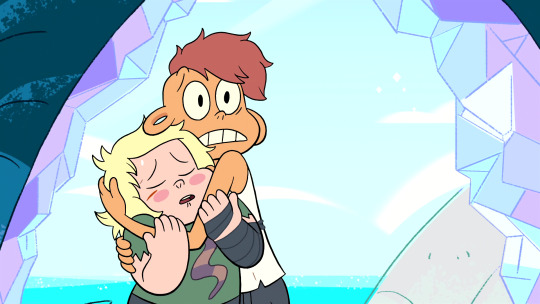
The only exception I can think of besides non-speaking background characters is Mr. Smiley's relationship with Mr. Frowney. It is not explicit, but subtext certainly suggests that Harold and Quentin used to be a thing.

There is also Pearl pursuing Mystery Girl and receiving her phone number, which does suggest Mystery Girl was attracted to femme-presenting people at the very least.
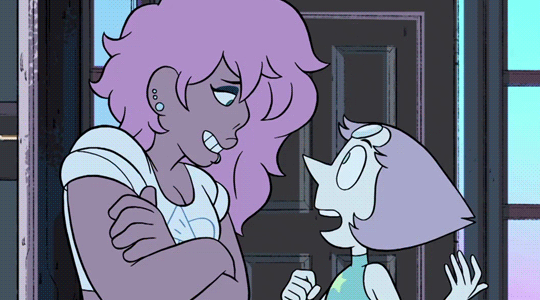
Oh, and of course we also see Peridot rooting for the Percy/Pierre ship on her favorite show, even though the canon of the show has Percy being pushed toward Paulette. And Uncle Andy made a reference to one of his relatives having a "partner," which seems like something he wouldn't do if it was a cross-gender relationship considering he also assumed Greg had a wife and used the word "wife." (This was offscreen, however--not even pictured characters.)
But overall, what we've seen is that we can have same-gender relationships as long as we can hide it behind aliens for plausible deniability. (Though at least in the United States, I think reports of Cartoon Network actively attempting to stop "gay relationships" from getting on TV is highly exaggerated.) It would be fantastic to get some explicit representation of humans having these relationships too. But at least there are some hints and some subtext, while we really don't have much of anything for human nonbinary characters.
Like most other situations in the show, I think the usually sensitive writing and nuanced understanding of these important issues would be in reach for the Crew on this topic. I really hope we will see nonbinary characters on this show in the future when there is no "alien" or "Fusion" explanation. Plenty of nonbinary humans exist in the real world, and this show would be a perfect place to start reflecting that.
#steven universe#nonbinary#su analysis#my su analysis#stevonnie#smoky quartz#su comics#lgbt characters#myblog
836 notes
·
View notes
Note
I don't want to be disrespectful, but I don't understand your issue with sherlock and "queerbaiting." I'm all for representation in media, however, realistically not everyone is gay. John has said multiple times in the show that he isn't gay, and he was married to a woman. Two men are allowed to be close friends without having to satisfy a tumblr-worthy homoerotic fantasy. As I said, I fully support representation, but just because two characters aren't gay for each other doesn't make a show bad
There are many things I’d like to unpack in your ask, nonny.
It’s difficult to know where to begin. I’ll start by saying I’m glad you agree that queer representation is important. So let’s start there, with the textual representation of queer people in Sherlock.
The characters who are textually queer in Sherlock include:
-Moriarty (confirmed most recently in TFP when he jokes about his bodyguard having ‘more stamina, but is less caring in the afterglow’), -Irene Adler (established as gay during the Battersea scene with John, in which to his assertion that he’s not gay, she replies, “well I am. Look at us both.” More on John later. She also nonconsensually drugs and whips Sherlock, which I think is extremely out of character for a professional in the kink community) -Culverton Smith (who has an honest to god hard on when he’s suffocating Sherlock and breathes his fear of death in and says in the most rapturous voice, “lovely”), -Eurus, (who suggests that the victim of her brutal rape could have been a man or a woman and she wouldn’t have noticed)-and to some extent Magnussen (who creepily kisses Sherlock’s hands, among other weird bodily power things he does, like flicking John’s face).
Perhaps you’ve noticed that this is a list of villains, all of whom are queer coded, and most of whom to some extent have the hots for Sherlock and violate Sherlock’s bodily autonomy when he is otherwise incapacitated (other than Eurus, because equating queerness with incest would be a little much even for this show).
So for our queer representation on this show we get 6, count em, 6 queer monsters, 6 queer psychopaths.
Forgive me if I’m less than thrilled about this.
BUT I was willing to overlook this, I was willing to forgive this, because to my view, the plot was inching forward towards a realistic portrayal of queer love—a nuanced and hard won happy ending, a love narrative that would speak to the complexities of human nature and queer identity.
Let’s turn to that question for a while. Queerness does not exist in a vacuum. It exists within a highly oppressive heteronormative framework. And so when you tell me, John has said many times that he isn’t gay, I say unto you: so did I.
My only way of surviving a homophobic environment was to swallow whole the lie that I was straight, to try as hard as I could to believe I was straight. This is compulsory heterosexuality. The result of this doublethink was that I had no interest in romance or sex. But I publically feigned interest in men for many years. I worked hard to convince myself that I was straight and normative. I was trapped deep in a subconscious closet. We often talk about the closet being something that we know we’re in and we want to be out of it. But I tell you, I honest to god thought I was straight. I thought I would marry a man and have children and live in the suburbs. As it turns out, none of those things have happened, thank god. But I spent many years of my life telling people I wasn’t gay.
By the way re: John and his marriage to a woman, being married to someone of the opposite sex has virtually nothing to do with whether you’re gay or not in a world where visible gayness is met with violence, death threats (my gf has literally been chased with a knife), rape threats (this has happened at least three times that I can think of off the top of my head), judgment, discrimination, and hate. Also, many people, like a younger version of myself once did, believe that they are straight and do their best to act accordingly, including marrying someone and finding out later that they were wrong in doing so. All this being said, John could easily be bi or otherwise queer. Suggesting that his marriage to Mary should preclude any and all attraction to men or taking that as proof of straightness is frankly biphobic and erases the bi experience.
But let’s move away from the personal significancer of a John Watson coming out/discovering himself narrative, and towards addressing your other comments.
Regarding your comment, “Two men are allowed to be close friends without having to satisfy a tumblr-worthy homoerotic fantasy”: From my perspective, summing up what the Johnlock fandom does as “tumblr-worthy homoerotic fantasy” is infantilizing and doesn’t give full credit to the depth of thought and nuance that goes into these transformative works.
I can name on one hand the pieces of mainstream media that tell a story like mine. Blue is the warmest colour is one, Carol is another.
The work these fanfiction authors are doing for representation by taking mainstream stories and queeriung them is monumental. But it is still not mainstream media representation. And we deserve that.
And now we come to the queerbaiting portion of my response.
Tropes are what tell us what kinds of archetypal stories are being invoked in the telling of a new story. In TV, there are many different kinds of tropes: plot tropes, lighting tropes, musical tropes, dialogue tropes, camera angle tropes, etc. For example a long lingering gaze in television codes romance for us. It’s a romantic trope.
For more on tropes, here are some useful resources: http://thorinlock.tumblr.com/post/132779606878/romantic-shots-in-bbc-sherlock
http://ifyouhaveenoughnerve.tumblr.com/post/76422437022/the-unabridged-dictionary-of-johnlock-tropes-157
http://tvtropes.org/
As a culture, we tell a lot of straight white love stories that end happily. Most of our romantic tv tropes come from these stories.
As a culture, we don’t tell many gay stories, and usually when we do, they are tragic and someone dies (http://tvtropes.org/pmwiki/pmwiki.php/Main/BuryYourGays). A common trope in stories about lesbians that I hate is that one woman leaves the other for a man—and that’s supposed to be a happy ending.
The point is, the filming and story telling tropes of romance are all over this show and these characters. Close shots of them gazing into each other’s eyes, the soft looks they give each other when they think the other won’t notice, the soft lighting accompanying these scenes, the dialogue, especially in the scene in ASiP at Angelo’s. As an exercise, try imagining that scene if Sherlock were a gorgeous woman.
JOHN: So you’ve got a boyfriend then?
SHERLOCK: No.
JOHN: Right. Okay. You’re unattached. Like me. Fine. Good.(modified from this transcript )
And then John licks his lips.
This is where it becomes queerbaiting. When the BBC tweets “Sherlock’s in love, but with who?” in order to promote s4, in which Sherlock’s romantic life is not shown to be developing at all, that is queer baiting. And it’s cruel.
More on queerbaiting:
https://www.autostraddle.com/how-do-we-solve-a-problem-like-queerbaiting-on-tvs-not-so-subtle-gay-subtext-182718/
http://www.afterellen.com/tv/471593-lets-end-queerbaiting-2016
Basically, the idea of gayness between Sherlock and John is a running joke on the show, a joke which has no pay off. Perhaps your sexuality has never been thrown in your face, or laughed at. Perhaps you have never been threatened violence or stalked or whistled at. But I have experienced all of this, just for holding my girlfriend’s hand in public.
So in sum, we have a show using romantic film tropes in order to make a joke about my sexuality, a joke at the expense of the marginalized.
Of course I’m upset and angry.
If this is a show about an epic platonic male friendship, that’s fine.
(Epic platonic male friendship is the oldest, most done narrative in existence, by the way. This is an excellent if somewhat dry book about the cultural shift in the twelfth century from tales of epic brotherly love/devotion between knights to tales of chaste courtly love between men and aloof women).
But in that case, stop it with the romantic TV tropes, stop teasing queer fans on twitter, stop making homophobic “no homo” jokes for the straight audience to have a laugh at my expense, and for god’s sake, stop writing all of your villains as queer coded psychopathic monsters. Was that really necessary??? It’s homophobic and it’s bad, lazy writing, and we deserve better representation than that. We deserve more than psychotic gay villains and desperately unspoken hidden subtext and winks and nudges on twitter from the creators. We deserve real representation, no hinting, no winking, no implying. Real, textual queer representation.
My last comment to you, nonny, is this: Indeed, not everyone is gay. And neither is everyone straight. I’m tired of never seeing myself or any part of my identity reflected in mainstream media.
For more information about media’s skewed representation of the world, see this GLAAD report.
#anon#askbox#second ask ever?#queer representation#sherlock#queerbaiting#tv tropes#lgbt#also i don't know how to add a read more thingy#sorry its long
78 notes
·
View notes